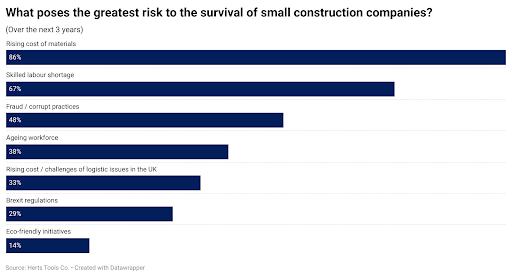This study was conducted by Herts Tools, specialists providers of plant hire in London. If you’d like to use graphics or data from the study, please get in touch.
The construction industry plays a central role in the UK’s ‘levelling up’ plans, making new infrastructure, homes and service projects a reality.
Yet recent reports have suggested that the government regeneration drive could lose ‘£10bn a year’ through fraudulent practices.
Within construction, the most common types of fraud include bid rigging, falsifying expenses, invoice fraud, bribery and stealing tools for other projects. So how are businesses being affected by fraud, just how prevalent is it and how can the industry prevent it?
To analyse the impact fraud is having on businesses in the construction sector, we surveyed 39 construction companies about their experience of it, compiling the results in the Fraud in the Construction Industry – Survey Report. The UK study exposed shortfalls in regulation and fraud protections across the industry.
Key findings:
- A quarter (26%) of UK construction companies have experienced fraudulent activity over the last year
- Larger companies are nearly twice as likely to fall victim to fraud
- Two in five construction companies didn’t report fraudulent activity to the police, meaning it’s more prevalent in the industry than authorities think
- The most common type of fraud is changing the quality of materials — three in five companies were affected by this in the last year
How is fraud impacting construction companies?
When surveyed about the biggest risks to their survival over the next three years, 86% of firms worry about inflation and 72% cited a shortage of skilled labour. A quarter of those surveyed highlighted fraud as one of the biggest risks to impact the future of the industry.
We asked construction companies who have fallen victim to fraud to identify the most common kinds of fraud in the industry.
Types of fraud in construction
The most frequently encountered fraudulent activity is reducing the quality of materials: this has happened to three in five companies over the last year. With the repercussions of the Grenfell Tower fire still reverberating and construction materials under the spotlight like never before, construction firms say misleading materials information from suppliers is rife.
Just under one in three companies have experienced invoice fraud. While one in five have encountered bid rigging, bribery or another form of corruption.
And at least one in every five firms have been affected by one of the following activities:
- Falsifying expense reimbursements
- False billing
- Contractors lying about qualifications
- Purchase fraud or stealing tools for other projects
What’s the effect on companies?
Being a victim of fraud can have extremely serious consequences. We asked construction companies who have been impacted by fraudulent activity how it affected them.
In 40% of cases, the business almost faced closure due to the fraud. 30% of companies lost employees as a result of fraud.
Yet two in five companies didn’t report fraud committed against them, meaning these crimes are more common than authorities believe them to be.
How can construction firms be protected against fraud?
Given that over a quarter of firms have been affected, it’s clear that more must be done to protect construction companies from fraud. Action should be taken by the government, industry regulators and construction companies themselves – to better guard against unscrupulous activity.
We asked construction companies which measures would be most effective.
Are small, medium and large construction companies affected differently?
Larger companies are twice as likely to experience fraudulent activity, with one in five small companies or sole traders falling victim to it over the last year. Although the risks to small companies are greater: three in five small companies were close to bankruptcy due to fraud.
A quarter of medium-to-large companies said their industry reputation was tarnished by the illegal activity. This figure rose to 40% for small companies.
And it’s not just the companies themselves who are affected: employees suffer too. Half of construction companies with more than 100 people lost employees as a result of fraud.
What are the greatest risks to the survival of small construction businesses?
Hit by a perfect storm of rampant inflation, Brexit fallout and staff shortages, small and family-run businesses in every sector face multiple challenges in the years ahead.
What issues do small construction companies identify as being the most serious over the next three years?

What to do if you’ve been a victim of fraud
While fraud can have devastating consequences for a business, there are things firms can do to regain control and mitigate the effects of fraud.
Action Fraud
The UK’s national reporting centre for fraud and cyber crime receive thousands of reports of fraud every day. Linked to the National Fraud Intelligence Bureau (NFIB), it provides practical advice and victim support.
Serious Fraud Office (SFO)
The Serious Fraud Office investigates and prosecutes serious or complex fraud, bribery and corruption. A non-ministerial government department of the Government of the United Kingdom that investigates and prosecutes serious or complex fraud and corruption in England, Wales and Northern Ireland.
National Crime Agency (NCA)
The National Crime Agency is a national law enforcement agency in the United Kingdom. It’s the UK’s lead agency against organised crime; human, weapon and drug trafficking; cybercrime; and economic crime that goes across regional and international borders; but it can be tasked to investigate any crime. They also supply guidance and procedures for reporting fraud.
Chartered Institute of Builders
Industry bodies who work with the Construction Sector Transparency Initiative (CoST) and the Anti-Corruption Forum to clean the sector up.

